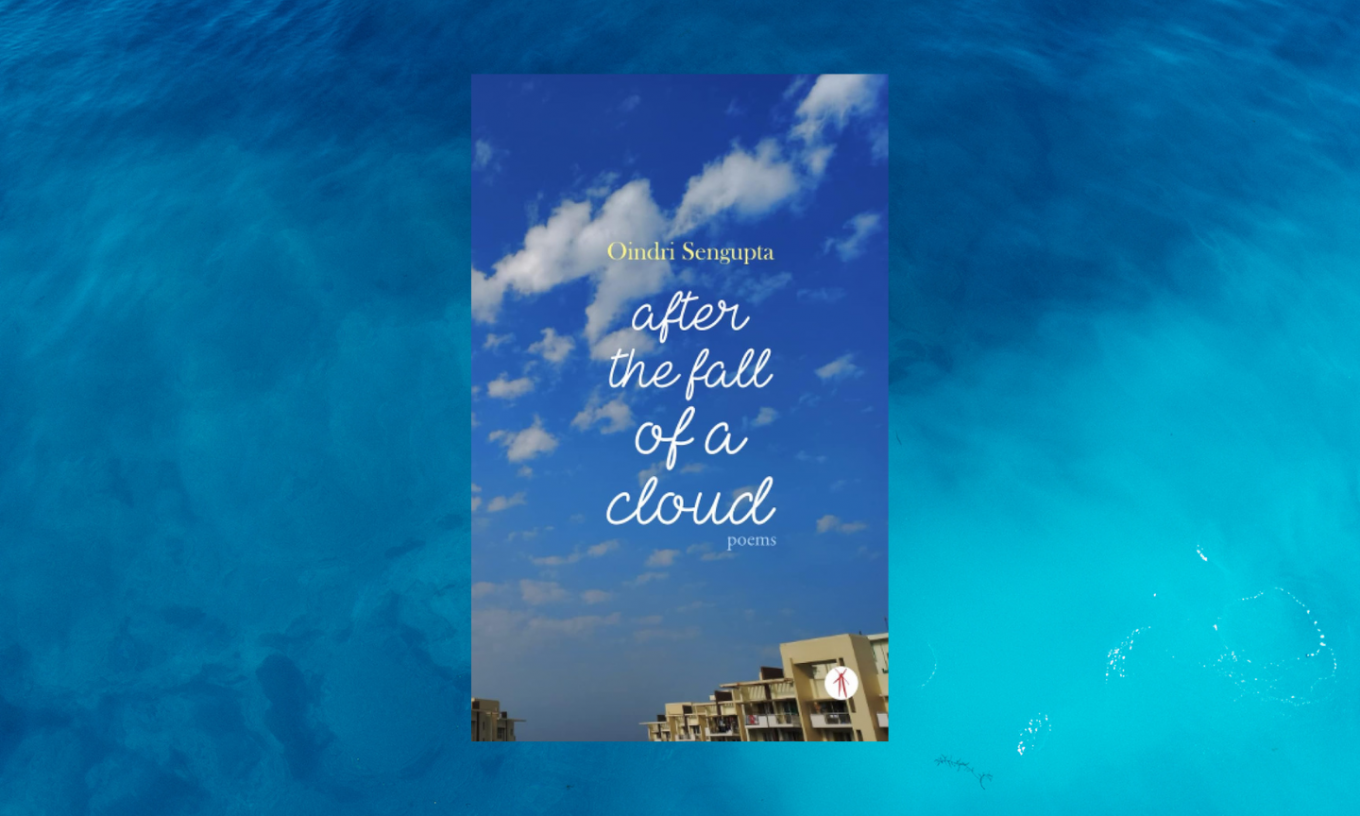Title: After the Fall of a Cloud
Author: Oindri Sengupta
Publisher: Hawakal Publishers
Year of publication: 2022
The fall of a cloud brings rain. Rain that energizes, replenishes, creates new dreams. But after the cloud has ‘died’. The title of Oindri Sengupta’s debut collection is evocative of this dual movement of nature: loss and resurgence; emptying out and replenishment – both acts of love as well as of protest. Oindri’s poetry is a constant traversal of these opposing forces, and somewhere along the way, and in its interstices, she arrives, often, at acceptance and peace that is not necessarily sustained. This arrival and then failing to stay put lends her poems in this collection, a tension that is strange and constant, creating restlessness out of still waters – or at least the constant possibility of this restlessness.
After the Fall of a Cloud contains 64 short poems. The writing is deeply sensuous and the pain that runs spine-like through them, almost palpable, a tangible entity. There are a few common metaphors that reappear across the collection, especially rain, rose, tomorrow, among others. The word ‘rain”, for example, appears 47 times across 64 poems. This repetitiveness of a specific word/s is exasperating at times. However, it is also easy to move on, and linger with Oindri’s evocation of space in these poems.
‘A Home Within’ evokes the feel and touch and the ‘being’ of intimate spaces, of spaces that speak of journeys both within and without, creating meta-narratives of presences and absences.
There is a home within a home.
A home where stories of lives give birth
to many others to be left untold.
A place of beautiful wanderings and solitude.
When a crow forgets to return to its nest
because it remembers too much of the light,
the home that lives within, comes alive
with all its fruitless longings.
Stories as homes – homes within a home, each a home to many others.
Our wanderings are always with the moon.
And in this long journey to death
I have come to know that home
is another illusion born out of those moments
when we were busy separating light and darkness.
The stories mentioned above, are then, stories of sifting light and darkness. Each story an illusion that we will be able to sift, each story collapsing into the next. Home, thus, becomes a space within which emotions and lives collapse to give way to newer ones.
In ‘Love – A Difficulty’, once again, we get this sense of space containing other spaces, and of the need for it.
Love is another difficulty
that fixes you inside a hollow
like the centre of a supernova…
The syntax seems to be of acceptance, but lined with restlessness that doesn’t let one be, fixing rather than facilitating movement, yet trying to breathe free of confinement.
Sometimes all I want to do is just breathe (‘How Not To Be’).
Assertions such as this appear and reappear across the collection, conveying a sense of not only longing but also, a coming to terms again and again, of not wallowing but walking the emotional terrain.
And then, it extends the image:
Sometimes all I want to do is just breathe
the entire sea inside my lungs.
Carry me to the edge of the moon and
I would tell you where
the heart of winter lies.
One wants to linger with the sea, to reach out and hold the images in the cusp of one’s hand. But the poet moves away, from the image of the sea to the edge of the moon, rupturing the vision and emotion that has been building up.
But the moon changes attribute. In ‘Light that Falls’, the poet has advice and a warning:
To hold my darkness,
you should be as light as the moon,
or else I would sink, like the sea.
Not a task for the light-hearted, for the one who cannot get to the core of this darkness or bear its weight. Companionship, even empathy, is something one must learn in order to fulfil its potential.
Nature is a dynamic, active character, an extension of the poet’s being. ‘Light that Falls’, for example, is a deeply evocative, image-resonant short poem whose emotional syntax seems to rise and then to sink, at one with the movement to the moon and light and then back to the darkness of the heaving sea.
Light and darkness run through the poems like twin threads, from one to the other, through one and then the other.
Tonight when stars will rest on the sea shore
from long journey of crossing the shores of death,
I will move from the corals of sand
to the light of darkness, … (‘Crossing the Land’)
The “I”, is as mentioned earlier, an assertive persona, a mood in itself. It is also an essence that crumbles to reshape itself, and then moves to question its very being-ness in the world in which it finds itself.
Cold winter running down my spine.
Wet night is chilling my senses-
making me crippled as insects under the soil.
Lazy falling of rain drops
in my soul.
I hear. I am in an asylum-
under treatment.
(‘Februaries’)
It takes courage for a writer, especially one putting out her first collection, to begin with such a poem – the sense of reality distorted from the word go, but the idea is driven home deliberately, unapologetically. The idea of the asylum is not meant to belittle the soul and the mind’s being what it is.
After the Fall of a Cloud uses language for the love of it, with a sharp ear for its sounds even if it does not always fit the world of the poems. One could ignore the world and listen to the words conjure images that entrance. Language could overwhelm intent and this is often a source of criticism, but sometimes it helps to have words wash over your senses, make you feel their beauty, the magic they can weave and evoke. Oindri does this quite often.
***
In the world of creative engagement, sensitivities and sensibilities are sharper, more deepened, energized. We are more responsive to the meta worlds in which we couch ourselves and through which we engage with one another. The work of art thus takes precedence over all else, for that is our mode of engagement with the self, first, and then with others around us.
When that work is a debut, it calls for the extra attention that debuting writers deserve – careful attention to its emotional and verbal syntax, a responsibility and a commitment to the writing that seeks to find its feet.
Oindri Sengupta’s After the Fall of a Cloud is one such book, a debut collection of poems that dreams in words. We, its readers, float with the poet through her dreams, jolt awake with her nightmares, stay suspended in her reveries and visions. And then, suddenly, we come wide awake through the slips in syntax, in redundant repetitions and wish that we could go back to that state of trance into which she is so capable of leading us. In short, a book full of promise that could have been edited more carefully.
Yet, one overlooks that gap and turns once again to the image and the sheer joy of deep longing in lines such as these
:…I know that the day
which brings sea to the shore,
is another dream where we sing, dream,
and make love with the nights. (‘Trees Have Wings’)





